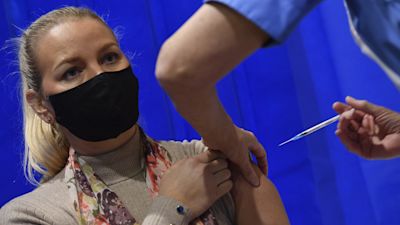How long does the Covid vaccine last and when will it be available to more people?

December 8 - hailed as V-Day - saw the start of the UK's biggest ever vaccination campaign, with thousands of recipients across all four nations playing their part in history.
In Wales, almost 1,500 people received the Pfizer/BioNTech Covid-19 vaccine on its first day of administration, according to the chief medical officer.
There are hopes for 6,000 people to receive the jab by the end of this week.
But what impact can we expect from the vaccine in the weeks and months to come?
Here are six key questions about the vaccine, answered by some of Wales' top doctors.
How safe is the vaccine?
There have been some concerns over the speed in which the vaccine was created and approved.
Dr Gill Richardson, co-chair of the Covid-19 vaccine programme board in Wales, said it has been put through the same safety checks as any other vaccine.
"Britain has one of the most stringent approval processes in the world," she said.
"Although it may seem sudden to people that it’s been 10 months to have a vaccine and roll it out, all of the savings in time have been at the front end, in terms of funding, getting the research done, and getting volunteers for the trials.
"The safety checks are just the same as if it had taken nine years to get here."
How soon can people get it?
Pfizer’s vaccine requires two doses for each person, taken 21 days apart, which means that we will all need a modicum of patience even when we finally get the jab.
In addition, the UK has ordered 40 million doses – so only around a third of the population will be immunised from Covid with this particular vaccine as it stands.
Wales has initially been supplied with enough doses to vaccinate 20,000 people.
People aged 80 and over, care home workers and NHS workers who are at higher risk were some of the first to receive the vaccine.
Dr Richardson said the Welsh Government will administer doses as soon as they arrive, but warned it could take a long time before all of those who need it get the jab.
"Although it is a marathon and we are right at the beginning of the journey, it will probably be a long time before we can get through the one million or so people that we have to," she said.
How long will it last?
There are still questions around how long the vaccine will be effective for, and fears that it will start wearing off before all those who need the jab have received it.
But Dr Richardson said researchers hope the vaccine will provide "enduring immunity", something that that will be the subject of follow-up studies.
She added: "It’s not just antibodies that protect us, we have T cells and they 'gobble up' the infected cells, so the T cell response is really important and people will be studying that as the vaccine is rolled out."
Should anyone be avoiding the vaccine?
There is currently a lack of evidence to suggest the vaccine is safe for pregnant women, according to Dr Richardson.
"There may be some pregnant women with special conditions where we may actually think that they should have it," she added.
"But for most women who are pregnant, planning a pregnancy within the next couple of months, or are breastfeeding, are not recommended to have the vaccine at the moment."
People with a history of "significant" allergic reactions have also been warned not to get the jab after two people had allergic reactions to it on Tuesday.
Pfizer said the vaccine was "well tolerated" during the trials with "no serious safety concerns".
When will other vaccines be approved?
The Pfizer/BioTech vaccine must be kept in a cold storage facility at a temperature of -70C, meaning those getting the jab are required to travel to its location.
Dr Richardson is optimistic that alternatives, such as the Oxford/AstraZeneca vaccine, will be available soon.
"We’re really hopeful that we will have another tool in our armoury before too long and we’ll be able to employ a vaccine that perhaps also will be more suitable to be taken to places than have people come to the vaccine," she said.
But the team behind the Oxford vaccine have said they have "no idea" when the jab will be approved by the British regulator.
England’s chief medical officer has said the UK should have three or four vaccines against Covid by the middle of next year.
Does this mean we can all stop social distancing?
While there is reason to cheer the much-needed arrival of a vaccine approved for use, we are still months away from something resembling normal life returning.
Despite the vaccine being 95 per cent effective, doctors are warning people to continue following coronavirus regulations.
"Hands, face, space still applies and will do for a very long time," Dr Richardson said.
"It’s in the hands of all of us as citizens to take those measures to not only protect ourselves, but our loved ones, and particularly those that are vulnerable in their health or those that are elderly."